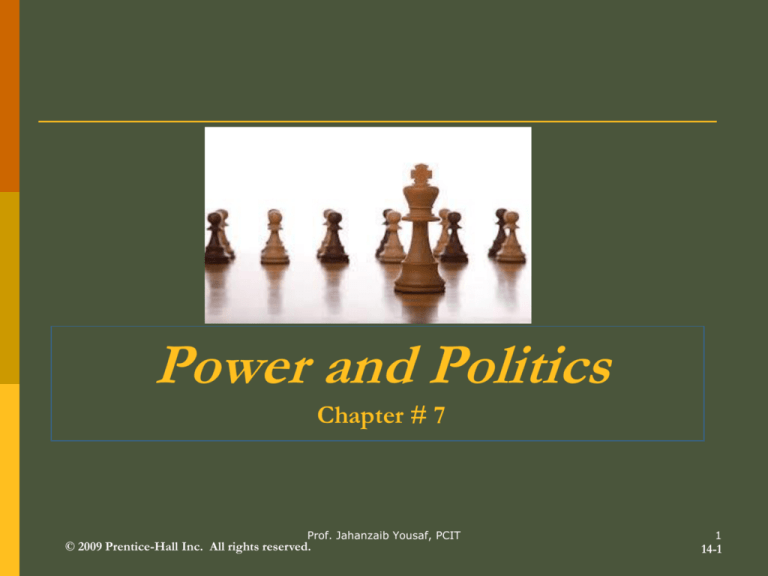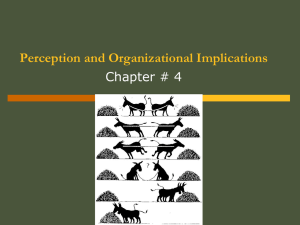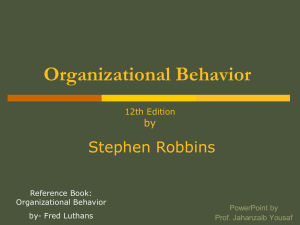
Power and Politics
Chapter # 7
Prof. Jahanzaib Yousaf, PCIT
© 2009 Prentice-Hall Inc. All rights reserved.
1
14-1
A Definition of Power
Power
The capacity that A has to influence
the behavior of B so that B acts in
accordance with A’s wishes
Exists as a potential or fully
actualized influence over a dependent
relationship
Dependency
B’s relationship to A when A
possesses something that B requires
The greater B's dependence, the
more power A has
Prof. Jahanzaib Yousaf, PCIT
© 2009 Prentice-Hall Inc. All rights reserved.
2
14-2
Contrasting Leadership and Power
Leadership
Power
Focuses on goal
achievement
Requires goal
compatibility with
followers
Focuses influence
downward
Used as a means for
achieving goals
Requires follower
dependency
Used to gain lateral
and upward influence
Prof. Jahanzaib Yousaf, PCIT
© 2009 Prentice-Hall Inc. All rights reserved.
3
14-3
Bases of Power: Formal Power
Formal Power
Established by an individual’s position in an
organization
Three bases:
Coercive Power
Reward Power
A power base dependent on fear of
negative results
Compliance achieved based on the
ability to distribute rewards that
others view as valuable
Legitimate Power
The formal authority to control and
use resources based on a person’s
position in the formal hierarchy
Prof. Jahanzaib Yousaf, PCIT
4
Bases of Power: Personal Power
Power that comes from an individual’s
unique characteristics – these are the
most effective
Expert Power
Influence based on special skills
or knowledge
Referent Power
Influence based on possession by
an individual of desirable resources
or personal traits
E X H I B I T 14-1
Prof. Jahanzaib Yousaf, PCIT
5
14-
Power Tactics
Power Tactics
Ways in which individuals translate power bases into
specific actions
Nine influence tactics:
Legitimacy
Rational persuasion*
Inspirational appeals*
Consultation*
Exchange
Personal appeals
Ingratiation
* Most effective
Pressure
(Pressure is the least effective)
Coalitions
Prof. Jahanzaib Yousaf, PCIT
6
Politics: Power in Action
Political Behavior
Activities that are not required as part of one’s formal
role in the organization, but that influence, or attempt to
influence, the distribution of advantages or
disadvantages within the organization
Legitimate Political Behavior
Normal everyday politics - complaining, bypassing,
obstructing
Illegitimate Political Behavior
Extreme political behavior that violates the implied
rules of the game: sabotage, whistle-blowing, and
symbolic protest
Prof. Jahanzaib Yousaf, PCIT
7
The Reality of Politics
Politics is a natural result of resource scarcity
Limited resources lead to competition and political
behaviors
Judgments on quality differ markedly based on the
observer’s perception
“Blaming others” or “fixing responsibility”
“Covering your rear” or “documenting decisions”
“Perfectionist” or “attentive to detail”
E X H I B I T 14-3
Prof. Jahanzaib Yousaf, PCIT
© 2009 Prentice-Hall Inc. All rights reserved.
8
14-8
Causes and Consequences of Political
Behavior
Factors that Influence Political Behavior
E X H I B I T 14-4
Prof. Jahanzaib Yousaf, PCIT
9
Employee Responses to Organizational
Politics
Most employees have low to modest willingness to play
politics and have the following reactions to politics:
E X H I B I T 14-5
Prof. Jahanzaib Yousaf, PCIT
© 2009 Prentice-Hall Inc. All rights reserved.
10
14-10
Defensive Behaviors
Employees who perceive politics as a
threat have defensive reactions
May be helpful in the short run, dangerous in
the long run
Types of defensive behaviors
Avoiding Action
Over-conforming, buck passing, playing dumb.
Avoiding Blame
Bluffing, playing safe, justifying
Avoiding Change
Prevention, self-protection
Prof. Jahanzaib Yousaf, PCIT
11








